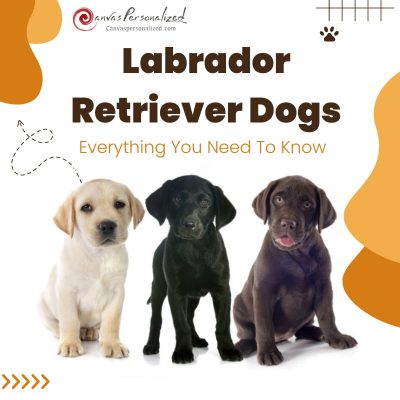Strong, intelligent, and playful are Boxer dog breed traits like being part of an active family. They are known as the most popular breeds, and although they may appear intimidating, they will be affectionate family pets. Continue reading these facts from the Canvas Personalized to determine whether this hunting dog is right for you.
1. History & Origin of the Boxer Dog Breed
Boxers were developed in 19th century Germany, descended from a mix of Mastiff, Bulldog, Great Dane, and terrier, with a possible ancestor from the now-extinct Bullenbaiser breed. Initially bred for bull-baiting dogs, they later became butcher’s helpers, wrangling cattle. Their name’s origin is debated: some say it comes from the German term “boxl” used in slaughterhouses, while others believe it reflects their playful “boxing” with their paws.
Boxers arrived in the US after World War I and skyrocketed in popularity. Classified as working dogs, they were early police dogs and seeing-eye companions. In 1904, the American Boxer Club officially recognized the boxer breed as the beloved companion today. Boxers excel as loyal family pets, especially known for their fondness for children.
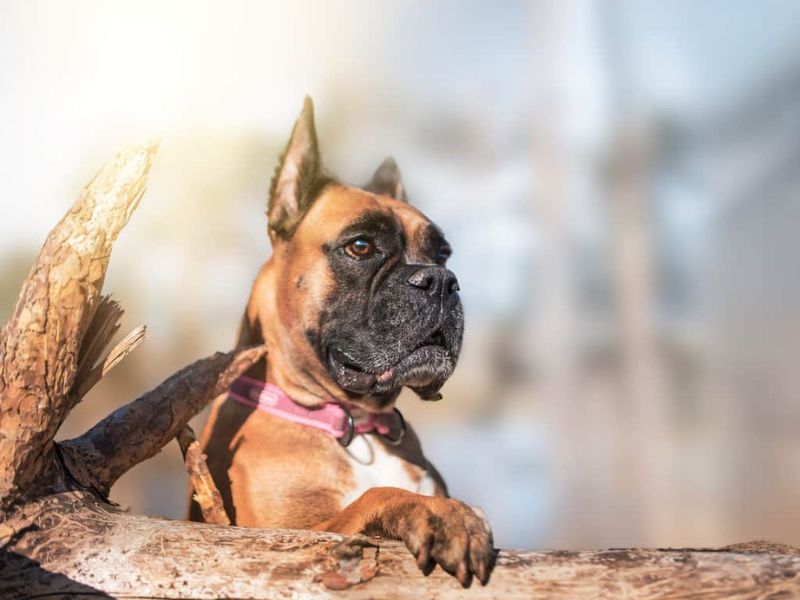
2. Boxer Dogs Traits
| Origin | Germany | Temperament | Friendly, willful, outgoing, playful & loyalty |
| Dog Breed Group | Dog fighting, Guard Dogs | Energy Level | Active/ High energy |
| Height | Dogs 22–25 in (56–64 cm) Bitches 21–24 in (53–61 cm) | Shedding | Occasional |
| Weight | Dogs 66–70 lb (30–32 kg) Bitches 55–60 lb (25–27 kg) | Tendency to Drool | Medium |
| Coat | Short, shiny, smooth, close-lying | Snore | Low |
| Color | Fawn or brindle, and white | Bark | Low |
| Life span | 10–12 years | Easy To Train | High |
| Good With | Families, children, other dogs and cats |
2.1. Boxer Dog Appearance
Boxer dogs are classified as medium- to large-sized dogs since they weigh 50–80 pounds and stand approximately 2 feet tall at the shoulder. Moreover, the boxer’s most outstanding distinguishing characteristic is its head. It also means it is brachycephalic, with a large, short head and square muzzle.
The perfect ratio of the length of the muzzle to the size of the head should be 1:3. Folds run along both sides of the muzzle from the nose’s root, and the nose’s tip should be higher than the root. Moreover, the lower jaw protrudes beyond the upper and curves upwards, generally called an underbite or “undershot bite.”
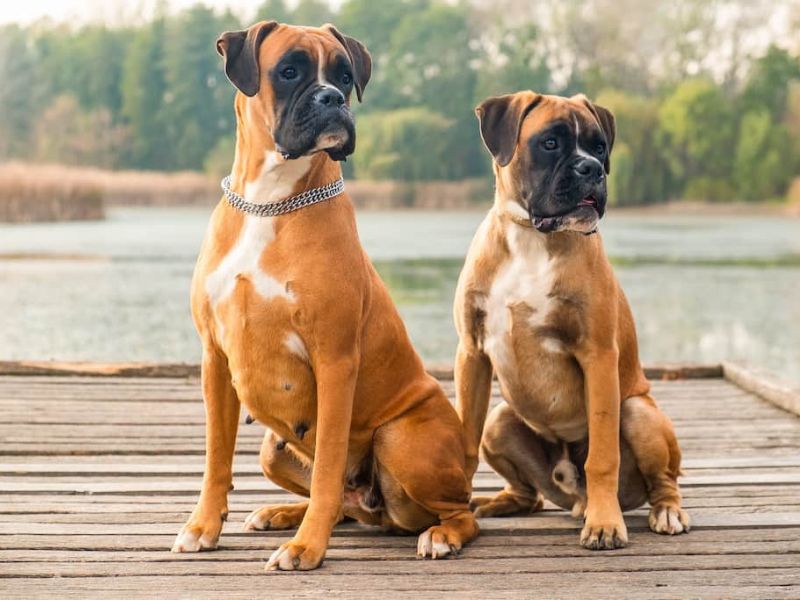
Beyond the head, Boxers are a powerful breed. They have a robust, muscular build with a deep chest and a short, powerful back. Their tails are typically docked and held high, while their feet are compact with well-arched toes.
Boxer coats are short and easy to care for. While fawn is a common color, these playful pups can also be brindle or white. Additionally, many Boxers have white markings on their chest, face, and paws. While entirely white Boxers exist and are not albinos, purebred black Boxers are not possible due to the absence of a solid black coat gene (though black markings around the eyes and lips are typical).
While the American Kennel Club recognizes only one Boxer breed, subtle variations exist based on origin:
- American Boxer dog: Less wrinkled, with prominent wrinkles mainly around the muzzle. They typically have wider muzzles and noses.
- German Boxer dog: Known for the largest bone structure, broader thighs, and a smaller nose compared to other Boxers.
- English Boxer dog: Considered the most delicate of the three, with smaller feet.
It’s important to note that these variations are minor, and all Boxers share the core traits of the breed.

2.2. Boxer Dog Breed Temperament
While some variations may exist (American, German, English), Boxer personalities generally revolve around loyalty and friendliness. They are intelligent, attentive, and high-energy companions who love adventures with their humans. While Boxers can be suspicious of strangers initially, they aren’t inherently aggressive. Their protectiveness makes them excellent watchdogs, always alert to potential threats to their loved ones.
This breed is generally gentle and playful with children, making them fantastic family dogs. However, proper supervision is crucial during interactions, especially with younger kids, due to their size and energy levels.

Boxers are working dogs at heart and require mental and physical stimulation. Left alone for extended periods, they can become bored and destructive. Like border collie and beagle dog breeds, boxers need exposure to various people, sights, activities, and experiences. The sooner the dog meets other pets and families, the better it will develop into a well-rounded, outgoing personality.
3. How to Care for the Boxer Breed of Dog
3.1. Ideal Living Environment
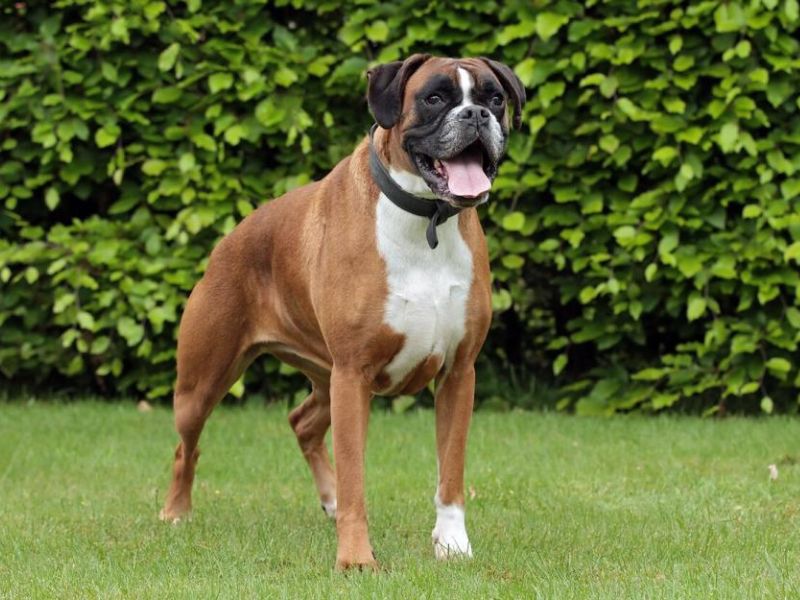
The boxer dog breed is adaptable to different environments, even on a country estate or an apartment. Keep your boxer puppy warm in the cold season because it has a short coat.
While Boxers generally cope well with hot weather, white Boxers may require extra protection. Dog sunscreen is readily available and a great way to prevent sunburn on their sensitive noses and ears.
Boxers are alert and protective dogs, making them good watchdogs. However, their playful nature and curiosity can lead to barking at passing animals. If you live in an area with potential distractions, a strong fence with no escape routes is a wise investment for your Boxer’s safety and to minimize unwanted barking.
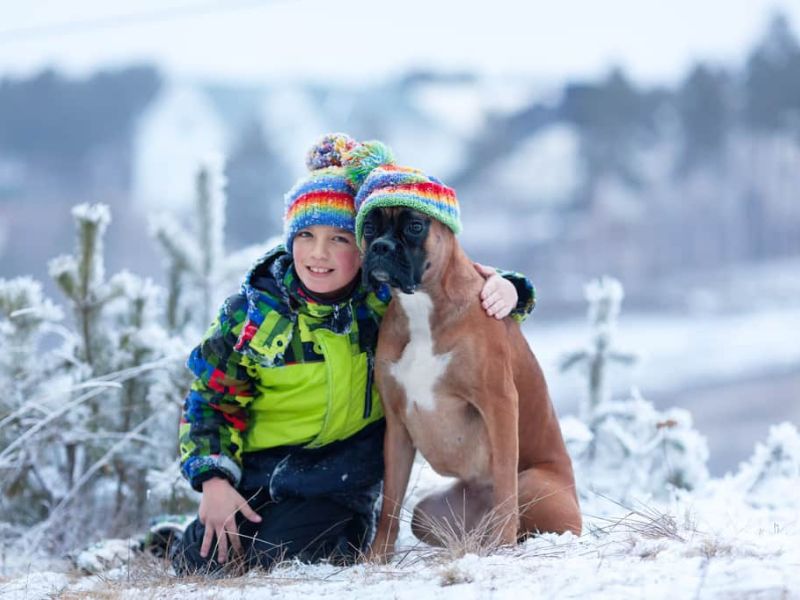
3.2. Daily Care & Grooming
Boxer puppies, like Pitbulls, have short and tight coats, so they need very little grooming. Although their solid black coat color is easy to care for, you must provide them with healthy dog foods, bathe them occasionally, and clip their nails.

Moreover, brush their teeth daily to prevent tartar accumulation with the help of a toothbrush and toothpaste. Surprisingly, drooling can be reduced by cleaning their teeth and gums.
With the deep facial wrinkles, you need to clean these with a damp washcloth after walking outside. The last important thing is always giving your boxer dog breed plenty of exercises daily to ensure excellent behavior.
>>>Get more knowledge about dog-caring tips to keep your pup healthy and happy!
3.3. Excercise Needs & Activities
Boxers excel as outdoor companions. Activities like jogging, hiking, or engaging games like fetch are excellent ways to keep them physically and mentally stimulated. Due to their high energy levels, some Boxer owners recommend up to two hours of daily exercise.
3.4. Training & Obedience
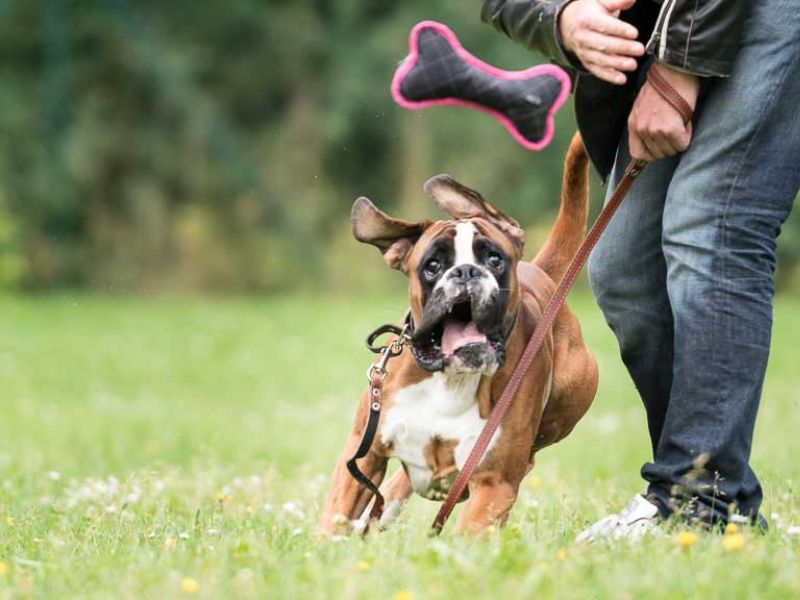
Boxer dogs are known for their intelligence and trainability. However, their playful energy requires patience and positive reinforcement techniques to teach your dog basic cues, such as how to sit, stay, and come when called. Harsh punishment methods are ineffective and can damage your bond. Therefore, focus on rewarding good behavior with treats, praise, or clicker training. This approach will keep your Boxer motivated and engaged during training sessions.
Some Boxers may exhibit territorial behavior towards other dogs or people. Leash training and close supervision are crucial in these situations. Additionally, consider enrolling your Boxer in socialization classes to help them interact positively with other animals and people.
Additionally, early socialization is vital for Boxers. By introducing them to various sights, sounds, and experiences as puppies, you can help curb unwanted behaviors like excessive barking or aggression.

Thanks to their intelligence and trainability, Boxer dogs excel in various activities. They can participate in canine sports, search-and-rescue services, and even become therapy dogs.
>>>Check out the best guide to teach your dog to go potty outside!
3.5. Nutrition
With their high Boxer dog energy level, they require a diet designed for a medium-sized, active breed. Get advice from your vet to look for high-quality dog food and give them the best chance of living a long and healthy life.
Keep in Mind
– A perfect diet plan should follow the AAFCO’s Role in Pet Food Regulation with two meals daily and little snacks. If your dog has a lot of exercises, the diet plan should include high-calorie foods.
– Feed your Boxer dry dog food that is large and difficult to chew. This will aid in plaque elimination and prevent dental problems.
– Keep an eye on your dog’s calorie intake and weight level to prevent him from becoming overweight. Raw fruits and vegetables or homemade recipes are also perfect healthy snacks.
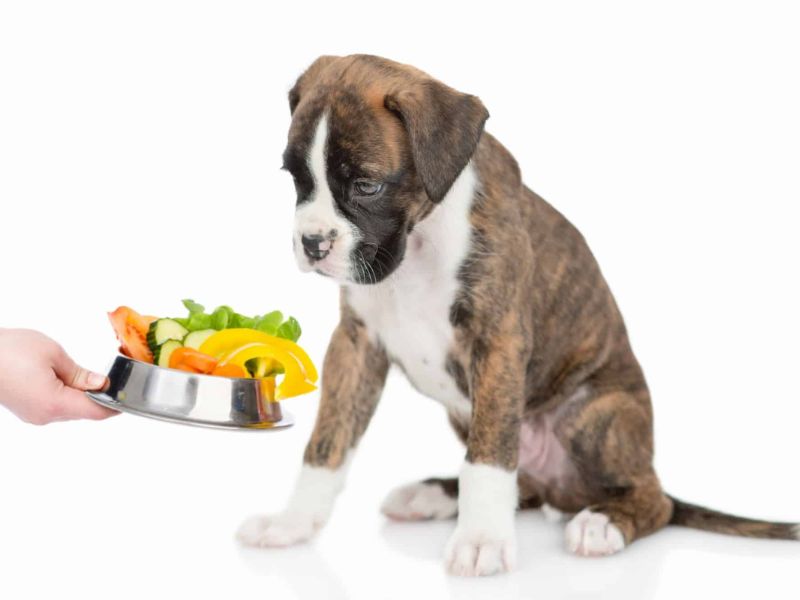
The diet will change as the dog’s age progresses, depending on weight, energy level, and health. Check the comparison table below to see the differences in food for adult dogs and senior dogs (typically around the age of 7 to 8 years).
| Nutrient | Adult Boxer Dog | Senior Boxer Dog |
|---|---|---|
| Protein | Slightly lower percentage than puppies to account for no growth | Lower than adults to prevent kidney strain and maintain muscle mass |
| Fat | Moderate amount to match their energy levels | Reduced amount to prevent obesity and support slower metabolism |
| Calories | 3 to 5 cups for males and 2 to 4 cups for females per day | Lower-calories food to match reduced activity levels |
| Carbohydrates | Necessary for energy but should not be too calorically dense | Should come from high-quality sources to maintain energy levels |
| Fiber | Important for digestive health | Increased fiber can help with gastrointestinal changes in seniors |
| Vitamins & Minerals | Essential for overall health | Adjustments may be needed for age-related health issues |
4. Boxer Dog Common Health Problems
The average life expectancy of a boxer dog breed is 10–12 years, so it is essential to test your dog’s needs at different times and the care it needs to stay healthy.
Young dogs, called cattle dogs, are primarily healthy, but boxers are prone to potential health problems like other breeds. So it’s vital to know whether they suffer from health conditions such as hip dysplasia, epilepsy, digestive difficulties, or heart conditions such as Boxer cardiomyopathy. Moreover, skin cancer is also a significant problem for boxers and requires extra sun protection.
The dog is more vulnerable to extreme heat because of its short coat. So, the Boxer does not sweat, and its snub nose and thick mouth will not provide enough cooling by panting. The best way is to avoid letting it walk in the hot weather and apply cooled water to its ears, tummy, and genitals, where blood vessels are closer to the skin.
You must ask your vet to check your dog soon once your dog has some symptoms. Without checking and testing immediately, it may die suddenly. Moreover, when adopting a boxer puppy, ask your breeder specific testing questions to ensure you have a healthy boxer breed of dog.

5. Welcoming a Boxer Puppy into Your Life
Adopting a Boxer dog can be a great way to welcome a new member into your home. Adoption fees typically range from $100 to $600, and some shelters may include initial health screenings. But you must pay an extra fee to take many health tests to ensure you have a healthy dog.
Reputable breeders invest significant time and resources into breeding healthy, well-socialized Boxer puppies. This is reflected in the Boxer dog price, which can range from $800 to $2,500 for a puppy from a reputable breeder. We recommend avoiding breeders who prioritize aesthetics over health or who overbreed their dogs. You can refer to some breeders that we have compiled below:
| Breeder | Location | Contact | Rating |
|---|---|---|---|
| Century Farm Puppies | Grundy Center, IA | (319) 415-8009 | 4.6 |
| Allison Hollow Puppies | Carthage, TN | (615) 735-1198 | 3.7 |
| Prairie Hill Puppies | Hutchinson, KS | (316) 719-6202 | 5.0 |
| Stonehill Kennels | Mount Morris, MI | (810) 686-2002 | 4.9 |
When selecting this breed, the initial Boxer dog price is not the only financial concern. You’ll need to consider the cost of their living needs, such as food, toys, and other items required to keep them healthy, secure, and happy with you.
>>Further reading:
- Border Collie Dog: The Essential Guide To Owning & Training
- All Chihuahua Dog Breed Information & Fun Facts To Take Care
The boxer dog breed is a playful, caring, loyal, and excellent guard dog. With a sense of humor and kindness, this breed will also become the best companion for the family. Check out these facts from the Canvas Personalized to determine if its outstanding traits fit your lifestyle.







